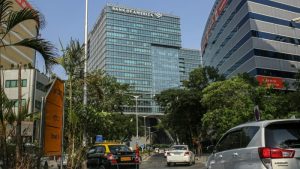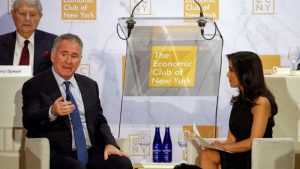Tech’s climate cost and TikTok’s day in court
Hello from Yifan, your #techasia host this week. I’m sending this newsletter after a flight to New York, where I’ll be participating in a Climate Economics Journalism Fellowship hosted by New York University.
The fellowship will take place as world leaders gather in the city to discuss the most urgent global issues at the annual United Nations General Assembly. Leaders of the UN’s 193 member states will begin general debate on Tuesday of next week, in which delegates from each country will address the international community.
The escalating climate crisis has been a key topic brought up by world leaders in their addresses in recent years and is expected to continue to headline this year’s assembly.
As our world goes through great technological transformation, much of the discussion has been focused on how emerging technologies could shape our economies. But their impact on climate is often overlooked, such as AI’s hidden cost. The rapidly growing technology has an insatiable appetite for energy and a growing carbon footprint that could lead to the acceleration of wildfires, floods, extreme weather and all of the dangers that come with climate change.
However, it is unlikely that AI’s climate cost will be a top priority for global leaders to discuss at the UN General Assembly this year as governments around the world are still grappling with the basics on how to govern artificial intelligence, including issues of misinformation and copyright infringement arising with generative AI.
No global framework exists to govern this potentially revolutionary technology, but a few countries, particularly the US and China, are racing to set governance standards. Can the two AI superpowers reach a certain consensus on how to oversee the powerful new tool at the General Assembly? Let’s wait and see.
TikTok’s day in court
Monday was perhaps one of the most important days for TikTok in the company’s history. The ByteDance-owned app laid out its argument in front of three judges at the US Court of Appeals for the District of Columbia Circuit, in an effort to overturn a sell-or-ban bill Washington passed in April.
TikTok is arguing that forced divestiture by the US government — under the Protecting Americans from Foreign Adversary Controlled Applications Act — is unconstitutional. It alleges that the law violates American users’ rights under the First Amendment of the constitution, and the company’s right to the guarantee of equal protection under the law.
However, judges weighed the question of whether constitutional rights should be extended to TikTok due to its Chinese ownership and the potential national security threats the US government alleges the app poses to the country, Nikkei Asia’s Yifan Yu writes.
The fate of the app is still up in the air after Monday’s court session. After hearing arguments from both sides, the judges did not make an immediate ruling on the case. TikTok has asked the judge to issue an injunction to stop the 270-day countdown that requires ByteDance to divest by January 19, 2025 or the app will face a total ban in the US.
Curbing chip technology exports to China
The US and Japan are nearing a deal after intense talks over restricting tech exports to China’s chip industry, even as Tokyo fears retaliation from Beijing.
The negotiations between the two countries, which dragged on for months, are close to a breakthrough, say people in Washington and Tokyo who are familiar with the matter. A Japanese official, however, has cautioned that the situation remains “quite fragile”, given the concerns over China’s response, Demetri Sevastopulo in Washington and Leo Lewis in Tokyo write for the Financial Times.
Washington is keen to unveil new export controls before November’s presidential election, including a measure forcing non-US companies to obtain licenses to sell products to China that would help its tech sector.
Japan and the US have discussed how to limit the impact of any Chinese retaliation as Washington and its allies seek to counter Beijing.
The US wants to make it harder for China to obtain critical chipmaking tools. The export controls are designed to close loopholes in existing rules and add restrictions that reflect the progress of Huawei and other Chinese groups in chip production over the past two years.
The restrictions would have the biggest impact on ASML in the Netherlands and Tokyo Electron in Japan.
Asia tech’s energy bill

Economies across Asia are attempting to seize once-in-a-generation opportunities as supply chains shift away from China. But do they have enough clean energy to sustain economic growth and combat global warming while attracting investment in chips, artificial intelligence, data centres and other technologies?
Taiwan and South Korea boast the world’s second- and third-largest semiconductor industries after the US, while Japan is working to regain its lost chip prowess. All three economies remain heavy users of fossil fuels, with Japan and Taiwan actually increasing their reliance on them since the 2011 Fukushima nuclear disaster, Nikkei Asia’s Lauly Li and Cheng Ting-Fang report.
The problem is twofold for places like Vietnam, Malaysia and Thailand, each a key beneficiary of companies moving production away from China amid escalating tensions between Washington and Beijing.
Who’s missing?
The majority of the world is absent from the discussion about how to govern AI on an international level.
Out of the 193 UN member states, 118 have not participated in any interregional AI governance initiatives, such as the OECD AI Principles, G20 AI principles and the latest Seoul Ministerial Declaration, according to a report released on Thursday by the UN Secretary-General’s High-level Advisory Body on Artificial Intelligence.
But the report, released just days before country leaders gather for the UN General Assembly in New York, found that Canada, France, Germany, Italy, Japan, the UK and the US participated in all the leading international AI governance initiatives cited, Nikkei Asia’s Yifan Yu reports.
“With its development in the hands of a few multinational companies in a few countries, the impacts of unleashing AI risk being imposed on most people without their having any say in the decisions for doing so,” the report said, urging countries to leverage the UN as the platform to lay the groundwork for an inclusive global AI governance framework.
Suggested reads
-
Taiwan chip industry suppliers set sail for Japan’s ‘Silicon Island’ (Nikkei Asia)
-
Microsoft wants more ‘clarity’ over AI chip curbs to Middle East (FT)
-
South Korea’s AI memory chips have Japan suppliers hungry for growth (Nikkei Asia)
-
TikTok warns of ‘staggering’ consequences from US divest-or-ban law (FT)
-
Aukus eyes potential Japan co-operation in autonomous maritime systems (Nikkei Asia)
-
AI will help Sony expand Japanese anime’s growing fan base (FT)
-
Sharp and Foxconn’s EV prototype shows new way of vehicle design (Nikkei Asia)
-
Abu Dhabi’s Mubadala takes stake in Revolut (FT)
-
DeepL translation targets Taiwan as next key Asian market (Nikkei Asia)
-
Pink Floyd in talks with Sony over music rights sale (FT)
#techAsia is co-ordinated by Nikkei Asia’s Katherine Creel in Tokyo, with assistance from the FT tech desk in London.
Sign up here at Nikkei Asia to receive #techAsia each week. The editorial team can be reached at [email protected].
#Techs #climate #cost #TikToks #day #court







